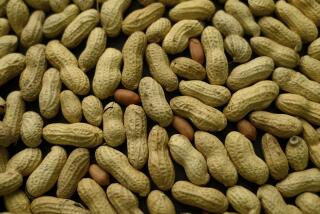Alleviating season allergy symptoms naturally
It’s hard to feel upbeat about spring weather if you suffer from seasonal allergies. While other people can spend all day outside without a sniffle, you can barely look at a field of grass or an oak tree without turning into a watery, miserable mess.
Lots of over-the-counter medications such as Claritin and Benadryl relieve allergy symptoms by blocking histamine, a compound that triggers all of the hallmarks of an allergic reaction to pollen: runny nose, sneezing and itchy eyes.
If you’re looking for a more natural way to combat pollen, you can choose from a wide variety of nutritional supplements that supposedly stop seasonal allergies in their tracks.
Allergy Support Plus, made by Health Products Distributors Inc., contains nettle leaf, turmeric and bromelain, among other natural ingredients. Take three capsules a day as recommended and you’ll get 500 milligrams of vitamin C (more than eight times the recommended daily value) and 20 mg. of vitamin B6 (10 times the daily value). It’s sold by some naturopaths, chiropractors and other alternative practitioners and can also be purchased online. A bottle of 60 capsules costs about $20.
PreHistin, which has been on the market only since March, supposedly stops allergies with a single active ingredient. The label calls it “cobalamin complex,” a fancy term for vitamin B12. Each cherry-flavored lozenge contains 3.3 mg. of B12, which is about 55,000% of the recommended daily value. Users are instructed to take two lozenges a day. You can buy a pack of 63 lozenges online or at a CVS drug store for about $30.
The claims
The website for Allergy Support Plus says it offers a “unique synergistic formula containing nutrients that naturally support the body’s response to allergens.” The site goes on to explain that vitamins, minerals and herbs work together to block histamine and ease inflammation.
Hank Liers, the founder and president of Health Products Distributors, says the supplement can bring quick relief to anyone with allergies, asthma or lung disease. “I’ve never seen anyone who used this and didn’t get good results,” he says.
A television commercial for PreHistin says that it is “proven to provide natural, non-drowsy relief.” Dr. Paul Ratner, a San Antonio-based allergist and paid spokesman for the product (his signature is even on the box), says the high doses of B12 in PreHistin will block the release of histamine — eventually. “You should start taking it two weeks before allergy season starts,” he says. “It doesn’t work instantly.”
An unpublished study funded by the company reportedly found that PreHistin reduced allergy symptoms by 1.3 points on a 12-point scale. That makes it more effective than Claritin or other over-the-counter antihistamines, Ratner says.
The bottom line
If nutritional supplements really are the answer to allergies, the word evidently has been slow to reach the allergist community. Dr. Corinna Bowser, a fellow of the American Academy of Allergy, Asthma and Immunology and a member of the academy’s committee on complementary and alternative practices, says that neither Allergy Support Plus nor PreHistin is proven to work.
Of the two, she feels that Allergy Support Plus is probably more worth a try because it contains a wide variety of ingredients that at least have a reputation for relieving allergies, even if that reputation isn’t always well supported.
In a small study of 69 allergy sufferers conducted more than 20 years ago, those who took 600 mg. of dried nettle leaf (a 50% bigger dose than you’d get from three capsules of Allergy Support Plus) every day for a week reported slightly fewer symptoms than those who took a placebo. A 2007 report in Alternative Medicine Review noted that “more rigorous trials are needed to confirm this finding.”
Dr. H. James Wedner, chief of allergy and immunology at Washington University School of Medicine in St. Louis, says that none of the ingredients in Allergy Support Plus has any proven ability to prevent or relieve allergies. In his mind, the large doses of vitamins seem futile. “Ninety percent of that is just going to end up in your urine,” he says.
Neither Wedner nor Bowser is aware of any evidence that the B12 in PreHistin would block histamine as claimed. Bowser contacted several of her fellow committee members and none of them had ever heard of using B12 supplements to treat seasonal allergies.
The company’s studies of PreHistin aren’t convincing because they haven’t yet passed muster in a peer-reviewed medical journal, Bowser says. “The results look good, but you can make any results look good,” she adds. (Ratner says plans to publish the studies are in the works.)
On the plus side, Bowser says even massive doses of vitamin B12 should be completely harmless. “It might not help. It could help. But at least it’s safe,” she says.
If a person feels better after taking either supplement, it’s probably because they expected to feel better, Wedner says. In other words, it’s likely the placebo effect in action.
“I bet if I came up with a nice, pretty pill, they’d get just as much relief,” he says.
Curious about a consumer health product? Send an e-mail to [email protected].
Read more at latimes.com/skeptic.
More to Read
Sign up for The Wild
We’ll help you find the best places to hike, bike and run, as well as the perfect silent spots for meditation and yoga.
You may occasionally receive promotional content from the Los Angeles Times.





